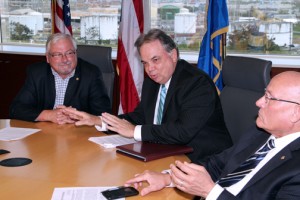Groups weigh in on government revenue shortfall

Two of the island’s largest private-sector trade groups, the Puerto Rico Chamber of Commerce and the CPA Society, weighed in Wednesday on the possible reasons for the $442 million revenue shortfall the Treasury Department reported for the month of April.
The Chamber attributed the drop to the effects of the so-called “national tax,” which they believe cut into profits for the corporations that filed their tax returns with requests for extensions and no payment. Some 20,000 Puerto Rican companies were on that boat, government officials confirmed.
“The substantial difference in collections vs. estimates for April 2014 shows once again that the national tax should have never been approved, and as a temporary measure looking at a possible elimination in 2015, it should be amended so that for tax year 2014, it cannot exceed 40 percent of net revenues before taxes for companies,” said Chamber President Jorge Cañellas.
The Chamber was one of the institutions that suggested such a limitation during hearings to discuss the creation of the national tax last year. He added that an explanation for the massive request for extensions from the corporate sector could be that they saw reduced profits or that they simply lacked cash flow to pay the new tax.
Rather than implementing the national tax, the Chamber had proposed an increase in the sales and use tax, which would have meant the burden would have been shared by all Puerto Rico residents, Cañellas said.
“The main consumption tax rate in countries like Spain, Dominican Republic and Argentina is around 20 percent, and in Puerto Rico we complain over a 7 percent sales and use tax that is full of exemptions, so the approach of where the tax falls has to change,” Cañellas said, noting an increase in the sales and use tax would rope in the underground economy.
Meanwhile, the CPAs said the decision by corporations to file for extensions without submitting a payment correlates to a drop in revenue volume. To reach its conclusion, the trade group conducted an informal survey among its peers that considered the universe of corporations in Puerto Rico.
“Of the approximately 80,000 corporations, only about 6,000 must have their financial statements audited by a CPA, because their revenue is of $3 million or higher,” said CPA Society President Aníbal Jover.
When asked the reasons for the collections drop in April and the high number of returns filed without payment, some of the responses suggested that there was no great change in the number of petitions for extensions when compared to prior years.
“The profile was substantially similar to years past. We saw two clear circumstances. First, even when the national tax had an impact, there was a drop in the volume of profit and hence a drop in regular tax responsibility, for which they had made estimated payments,” Jover said.
“In turn, there were many instances that even when the national tax had its effect, companies used overpayments from previous years. That, without mentioning that there was a lot of movement in purchase and sale of tax credits,” he said.
The surveyed group pointed out that estimated payment rules were changed and advance payments were made in November and December 2013 as a result, and corporations did more tax planning, including the purchase of credits, which this year was quite common as using them was not allowed in previous years, Jover said.
“It’s a bit difficult to compare this year to previous years as the national tax is a tax on gross income. That is, although the corporation has losses or its gain is minimal, it is up to the taxpayer to make a payment. This collection was made in late 2013,” he said, also noting that some companies may have filed unpaid returns for a lack of cash or credit lines.
He said the likelihood that the majority of the 20,000 corporations that filed for extensions without submitting a check are small businesses.
“We believe the time has come to evaluate measures our tax reformulation committee is analyzing to suggest changes in benefit of Puerto Rico’s economic development,” Jover concluded.















